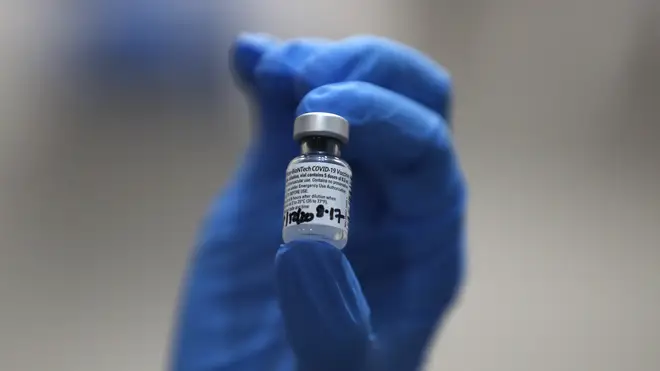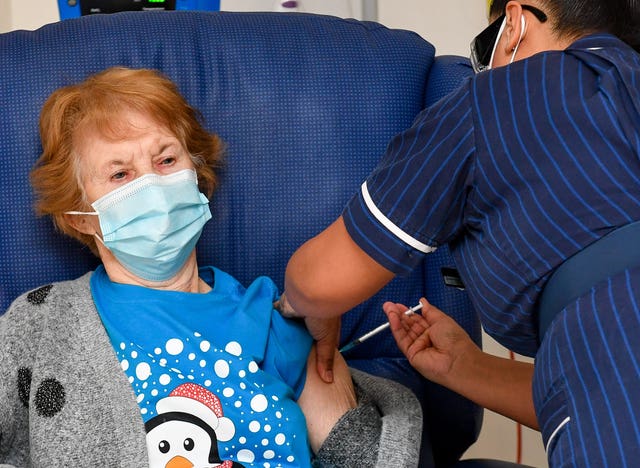
Nick Abbot 12am - 1am
15 December 2020, 14:44

The Pfizer/BioNTech jab is already being used in the UK, US and Canada.
As Britons, Americans and Canadians begin getting immunised with a German-developed vaccine against coronavirus, pressure is building on the European Medicines Agency to approve the jab.
German officials have been especially vocal – given the involvement of Mainz-based BioNTech alongside US firm Pfizer – that they want it approved before Christmas.
Here is a look at the EMA approval process.

– What is the European Medicines Agency (EMA)?
The EMA is Europe’s medicines regulatory agency and approves new treatments and vaccines for all 27 countries across the European Union.
The agency is headquartered in Amsterdam and has nearly 900 employees.
– Why is the EMA taking so long to approve a vaccine?
The EMA’s approval process for coronavirus vaccines is largely similar to the standard licensing procedure that would be granted to any new vaccine, only on an accelerated schedule.
Companies will still need to submit follow-up data to the EU regulator and the approval will need to be renewed after one year.
EMA executive director Emer Cooke said while all of the regulatory agencies in the UK, US and Canada are largely looking at the same data, “we may not have all gotten it at the same time”.
The agency began its expedited approval process of the Pfizer/BioNTech vaccine in October and the companies formally asked for their shot to be licensed on December 1.
Using its expedited approval process, the EMA says the time for assessing a new drug or vaccine has been shortened from about 210 days to fewer than 150.

– How will the EMA decide whether or not to approve the vaccine?
On Tuesday, the EMA announced it is moving a meeting originally scheduled for December 29 to assess the Pfizer and BioNTech vaccine to next Monday, after receiving additional data from the companies.
The announcement came after Germany’s health minister and others had publicly demanded that the agency move quicker.
During the EMA meeting, experts will discuss the data behind the Pfizer/BioNTech vaccine.
The meeting, which will be closed, will include a presentation by two officials charged with assessing the vaccine and could also include bringing in company representatives to answer questions.
Within hours of the meeting’s conclusion, the EMA will issue a statement on whether or not it is recommending the vaccine be approved.
Several days later, they will release their full scientific assessment explaining the decision.
The EMA’s approval is valid in all 27 EU countries and once it is granted, countries can start receiving vaccines for immunization campaigns.
An Italian health official says all EU countries want to start vaccinations on the same day.
– What does Germany think?
Germany is increasing pressure on the agency, with Health Minister Jens Spahn saying: “Our goal is an approval before Christmas so that we can still start vaccinating this year.”
He has expressed impatience with the EMA, noting Germany has already created 440 vaccination centres, activated about 10,000 doctors and medical staff and is ready to start mass vaccinations.
The German Hospital Association has demanded the agency issue emergency authorisation for the Pfizer/BioNTech vaccine.
Other EU nations are also getting impatient.
“My hope is that the EMA, in compliance with all safety procedures, will be able to approve the Pfizer/BioNTech vaccine earlier than expected and that vaccinations can also begin in the countries of the European Union as soon as possible,” Italian Health Minister Roberto Speranza said on Tuesday.

– Are any other vaccines being examined?
The EMA is planning to convene a meeting on January 12 to consider approving the coronavirus vaccine made by Moderna but said that discussion could also be brought forward.
It is also assessing data from two other vaccines, one made by Oxford University and AstraZeneca and the other by Belgian firm Janssen.
– How will the EMA make sure vaccines are safe?
The agency usually asks companies to deliver data on vaccines’ safety and side-effects every six months but due to the coronavirus pandemic it will be asking companies for that data every month.
Although tests of the Pfizer/BioNTech vaccine suggest the shot is safe and about 95% effective in preventing Covid-19, there is still limited long-term safety data on it.